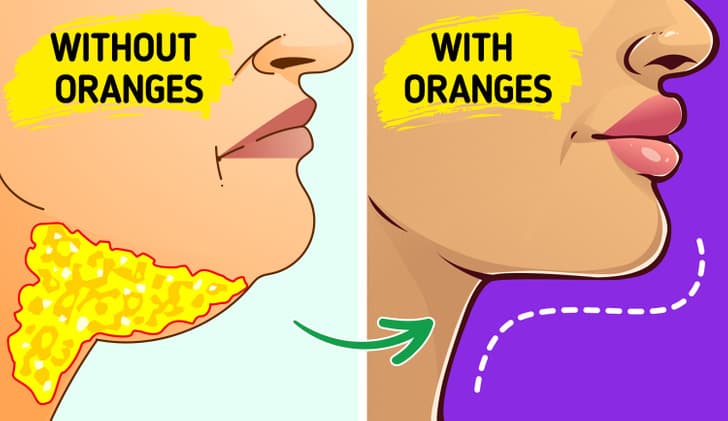
Scurvy, a disease that plagued sailors the most, was formerly feared in an era of transoceanic travel and rare medical advancements. Today, we understand that scurvy is nothing more than a vitamin C shortage and that it is easily treated by eating one orange each day.
We wanted to demonstrate to you all the health advantages that consuming one orange every day may provide for your body.
Benefits Of Eating An Orange Every Day; Check Out
1. It aids with gut health.
What Are The Benefits Of Eating Oranges

Orange eating on a daily basis may benefit our intestinal bacteria, according to certain studies. Additionally, it lowers LDL, glucose, and insulin sensitivity (bad cholesterol). Orange juice encourages the development of intestinal bacteria, which is crucial for human health and functions as a prebiotic.
2. It can help you on your weight loss journey.
Benefits Of Oranges On Skin

We must exercise and maintain a balanced diet, which entails consuming all the nutrients our bodies require to function effectively, in order to reach our weight loss goals. The good news is that oranges are incredibly rich in critical nutrients, and if we eat just one orange per day, we can get by with some of them.
An orange of medium size contains only 60 calories. The fruit also has 3 grammes of fibre, which has advantages such as better intestinal health, healthy cholesterol, a reduced chance of heart disease, and a slower rate of sugar absorption in our systems.
Additionally, fibre might prolong our feelings of fullness. A diet high in it can assist us in lowering our calorie intake and desires, which can lead to weight loss. Since the orange flesh contains the majority of the fibre in orange, it is important to eat both the orange flesh and its juice.
3. It assists your body in the creation of collagen.
Eating Oranges Benefits For Skin

Approximately 70 mg of vitamin C are included in one orange. This essential component offers amazing advantages as well, such as enhancing iron absorption, reducing inflammation and blood pressure, and aiding in the formation of collagen in our bones.
Our bodies generate the protein collagen. It supports tissues structurally and aids in critical procedures including immune response and tissue repair. We age and develop droopy, dry skin as a result of the slowing down of collagen production and the loss of elastin as we age.
Since collagen loss is a natural aspect of ageing, it is impossible to completely stop it, but we may try to slow it down. Eating an orange a day may help.
4. It can be useful to maintain good eyesight.

According to research, eating an orange every day will reduce your chance of macular degeneration, an eye illness that can cause central vision to become so blurry that even glasses are no longer helpful, by 60%. This syndrome may develop as a result of ageing naturally.
Since vitamin C helps maintain the health of the blood vessels in our eyes and can be used to prevent cataracts, it is crucial for maintaining good vision. It could be a good idea to start monitoring our daily vitamin C consumption if we want to have a strong vision for the future.
5. It protects important organs, like the heart and brain.

An increase in focus, memory, and attention is linked to normal levels of vitamin C in our blood, claims a study. One medium-sized orange delivers the required daily dosage of vitamin C that our body needs to keep healthy, which can help our minds stay bright as we age. This necessary vitamin also functions as a potent antioxidant to fend off free radicals that can harm our brain cells.
According to a study of 10 studies, drinking orange juice may help reduce several risk factors for cardiovascular disease. This suggests that heart disease which is the leading cause of early death might be prevented by drinking this wonderful juice.
6. Boosts your immunity
In addition, oranges include copper, phosphorus, magnesium, manganese, selenium, folate, niacin, thiamin, riboflavin, vitamin B-6, folate, and pantothenic acid. Oranges are said to strengthen the immune system because of the high vitamin C content they contain (more than double the daily need).
7. Helps in brain development
Oranges contain folate and folic acid, which support brain growth and maintain the crucial organ in top condition. In fact, because of these nutrients, oranges are healthy fruit for expectant mothers because they protect the infant from developing neurological issues in the future.
8. May support cancer prevention
Cancer may be a difficult and frightening condition for both the sufferer and the person providing care. According to studies, an ingredient in oranges called D-limonene can help prevent several cancers, including skin, breast, and lung cancer. Additionally, Vitamin C and antioxidants support the body’s immunity, which aids in the battle against cancer cells. Here are some dietary practices to prevent cancer.
9. Prevents hair loss
Oranges are rich in vitamin C, which is necessary for the production of collagen, which holds the tissues in your hair together. Everyone dislikes having bald patches on their heads, and eating oranges can prevent you from losing your fine hair as you age.
Some symptoms of scurvy or vitamin C deficiency

Since the majority of us obtain adequate vitamin C from our everyday diets, scurvy is an extremely uncommon ailment, but it has happened previously. Collagen is generated by our bodies with the help of vitamin C; if not enough collagen is produced, the tissue begins to deteriorate.
Fatigue, lethargy, anaemia, gum disease, tooth loss, inadequate wound healing, depression, swelling, and bone pain are a few of the signs and symptoms of scurvy.
BONUS: Eat the peel to get more nutrients.

Despite its harsh flavour, the orange peel has some advantages. Compared to the pulp, this orange portion has nearly four times as much fibre. Along with vitamins A, B1, B2, B6, and B9, it also contains three times as much vitamin C as the inside fruit does.
Even though the peel is packed with nutrients, consuming it may not be the best idea due to its difficult-to-digest nature and potential pesticide residue. It could be sufficient to properly wash the fruit and grate part of the peel over your meal to reap the fruit’s nutritional benefits.
Contact your doctor if you’re uncertain about your daily nutrient intake. Keep in mind that anything can be hazardous in large doses.
Which advantage caught you by surprise the most? Ever thought about consuming an orange peel? What about you? Tell us in the comments, please.
What Are The Side Effects Of Eating Too Many Oranges?
Oranges are healthy, but only if you eat them in moderation.
Oranges have a high acid content, thus eating too many of them might cause heartburn. They may also make GERD symptoms worse (gastroesophageal reflux disease).
Consuming an excessive amount of oranges can also cause indigestion due to their acidic nature.
The abdominal ache might also result from consuming too many oranges. According to one study, a person who consumed oranges experienced acute gastrointestinal pain. Its high fibre content might account for this.
Too many oranges may also cause diarrhoea, according to some anecdotal evidence. To support this claim, more research is necessary.
It is crucial that you monitor how many oranges you eat each day as a result.
How Many Oranges Can You Eat In A Day?
You can eat one to two oranges a day because of the high vitamin C content and the abundance of other advantageous phytochemicals, albeit there is no conclusive study to support this.
Preview photo credit Usty / Shutterstock.com, Usty / Shutterstock.com



